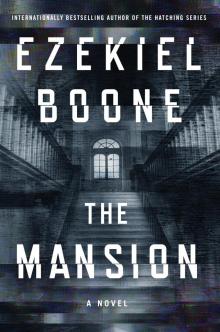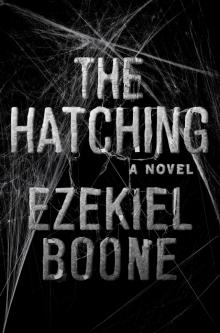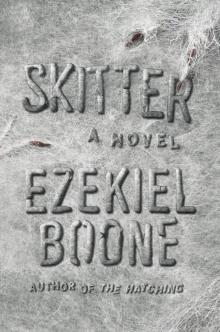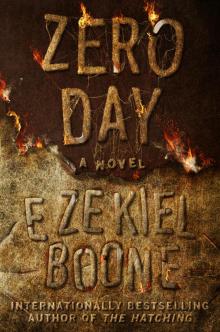- Home
- Ezekiel Boone
Zero Day Page 7
Zero Day Read online
Page 7
He banged against a desk and then spun around again just in time to see an arm reach out and grab Steph by the back of her collar, dragging her out the door, and then he himself was being manhandled. If they hadn’t been seated near the exit, he wondered if they would have gotten out. He wanted to believe that Broussard wasn’t intent on killing the president, but he was sure Broussard wouldn’t shed any tears if Manny caught a bullet.
As it turned out, he had caught a bullet. He hadn’t realized it as they ran down the corridor or as they sprinted across the flight deck to the president’s helicopter, Marine One. It was only when he was already aboard the Sikorsky VH-92A, when Agent Cutbert told him he was bleeding, that he even understood he’d been shot. He pulled up his shirt to see a neat line across his right side. It was a few inches above his hip, through the part of his body that had the most padding. While Cutbert pulled on a pair of nitrile gloves, Manny unbuttoned his shirt. It was covered in blood, although he wasn’t sure how much of it was his own.
Cutbert poked and prodded in a way that made Manny wince, and then pressed a gauze pad on the wound. “Here,” she said, “just hold this tight. Barely a scratch. A quick in and out. Basically just a shot across the bow. Almost more like a cut than a real bullet wound.”
Manny was too distracted to feel insulted by how dismissive she was. A phalanx of Secret Service agents stood on the flight deck in a rough semicircle around the helicopter, guns out. Several of them were holding compact machine guns. Just a few seats over from Manny, Steph was almost completely hidden behind a wall of three agents. Manny was glad to see that one of them was Tommy Riggs, who alone was big enough to make Steph invisible.
The heavy rotors of the helicopter began to slice through the air, and Steph began struggling to get to him.
“No!” she yelled. “We’re not going!”
“Are you out of your mind?” Manny yelled back over the sound of the helicopter powering up.
Outside, they saw Billy Cannon with his hands up, talking to the line of agents.
“Let him through!” Steph shouted.
“Madam President,” Billy said, hoisting himself up into the helicopter. “You’ve got to get out of here now. Right now. Broussard wouldn’t have done this if he didn’t think he could pull it off. I think we can hold him off for a few more minutes, but it wasn’t just the men in the room. He’s got the ship’s captain on his side, and that means he’s going to have the whole ship soon enough. Without you and without the football, it’s going to be a little while before he can use nuclear weapons. He knows about Operation SAFEGUARD, and he’ll start working on that immediately, but it’s going to be at least seventy-two hours, maybe longer, before he can shut it down. But if he gets his hands on you, he’ll be able to act almost immediately.”
“We’re not going without Melanie,” Steph said.
“My ex-wife?” Manny kept his hand pressed to his side. He was aware that he probably looked ridiculous—his shirt wide-open, blood all over himself, his tie still around his neck.
“Not everything is about you, Manny,” the president said evenly, and in another time or place Manny would have laughed.
She turned back to Billy. “It’s either my way, where we try to save what’s left of the United States—what’s left of the world—or Broussard’s way. And if we leave here without Melanie and the other scientists, we’re giving up. Without them, there’s no chance. We might as well just give ourselves up. We can only stop Broussard from using nukes for, what, seventy-two hours? Seventy-two hours until they undermine Operation SAFEGUARD and all bets are off.”
“Ma’am, you could always exercise Matthew 5:45.”
Manny wasn’t sure what surprised him more: that he didn’t have any idea what Cannon was talking about, or the look of surprise on Steph’s face. Very, very few people knew about Operation SAFEGUARD, perhaps fewer than a thousand. It had been enacted during the second Bush’s presidency and served, essentially, a gatekeeping function. When a nuclear strike was ordered, Operation SAFEGUARD had to provide a second confirmation before the weapon could work. It was technically complicated and very secure, but it had been designed to stop a rogue officer or a mistake, not a coup. As long as the officers inside stayed loyal to the president, the arsenal was worthless to a single bad actor. Unfortunately, since it had never been conceived of as a way to protect against the entire military, there were ways to work around it. Manny figured that Billy’s estimate of seventy-two hours was probably accurate. But what the heck was Matthew 5:45?
“How the hell do you know about Matthew— No,” Steph said. “Never mind. I don’t care how you know. I don’t think we’re there yet. I hope we’re not there yet. That’s an extreme step. Right now we need to get Melanie and the other scientists. She promised me an answer, and I want an answer.”
Manny looked at her and then out over the flight deck. There were sailors all over the place, but they didn’t move with anything more than their usual urgency. Aside from the sailors close enough to do double takes at the line of Secret Service agents with their weapons drawn, there was no real indication that anything was out of the ordinary.
“Crap.” He turned to Billy Cannon. “She’s right. We can’t leave without them.”
“You can and you will.”
The voice, deep and full, was Special Agent Tommy Riggs’s. He hovered over Steph and put his hand firmly on Manny’s shoulder. “Our first priority is the president’s safety. You might need those scientists, but you don’t need to be here.”
Manny felt paralyzed. Steph was right, and Tommy was right. What was the point of running from Broussard if they didn’t have a better plan? But if they stayed, what were the chances that they’d be able to get Melanie and the other scientists out before Broussard hunted them all down?
Maybe solving one problem solved the other.
“Okay. We’re taking off!” he yelled over the rotor wash.
“No, Manny—”
He cut Steph off. “Broussard will let us go. He doesn’t need you. And it will buy us time. You know as well as I do that with Operation SAFEGUARD it’s not actually that easy to order unauthorized nuclear strikes. With you off this tub, we’ll have a chance to get Melanie out. But if we stay and try to do it now? Well, you’d be asking a bunch of good men and women to commit suicide. There’s something like four or five thousand members of the armed forces on this aircraft carrier, and we’ve got maybe twenty Secret Service agents.”
Stephanie hesitated and then looked at Billy. “I want to know how you found out about Matthew 5:45. Not now—after we’ve gotten through this. You really think that’s the right thing to do? That I should exercise it? Because if you know what Matthew 5:45 is, you know we can’t walk back from it.”
“I do, ma’am.”
“Even though you’re a military man and—”
“You’re right about not using any more nukes. It’s that simple. Mutually assured destruction is only a good strategy if it never comes to pass. It was true with the Soviet Union and it’s true with these spiders.”
Steph nodded. “Okay. I’ll consider it. In the meantime, if I’m leaving, that means I’m counting on the two of you,” she said, looking first at Billy and then at Riggs. “You better follow through. You get me Melanie and the other scientists. You get me my answer.”
She reached out and solemnly shook the hands of both men. They got off the helicopter, and everything after that was a blur. He and Steph were buckled in, and Marine One practically jumped off the flight deck, the pilot angling the helicopter hard, the engines screaming. When they traveled in DC, they usually flew in a convoy of four helicopters rotating in a sort of shell game to try to confuse potential attackers, but today it was just the one.
It took Manny a while to realize he was holding his breath, that he was waiting to see if they were going to be shot down. But after five or ten minutes he knew Broussard was going to let them go. It was one thing to get support for a mutiny, Manny figured, an
d another thing entirely if he blew the president out of the sky. No, he thought, they were safe.
And then, immediately after having the thought, he laughed. Safe.
As the helicopter’s shadow skipped across the waves, Manny leaned back and closed his eyes. He wanted to ask Steph what the heck Cannon had been talking about with Matthew 5:45—he recognized that it was a Bible verse—but the adrenaline had left his body. What he needed at that exact moment was just to close his eyes.
Delhi, India
She surveyed the world before her. Around her, the little ones skittered and danced, emptying the cobwebbed packages and bringing her food.
There were pinpricks of fire, entire blocks in flames, made to look small by their distance. The little ones gave a wide berth to fire. There was plenty to eat here without risking the hot crackle of death.
She moved forward, to the edge of the tall building. It was a slow, laborious process. She preferred to rely on the little ones, but the great pulsing hunger drove her to where she could see the feast spread out below.
Oxford, Mississippi
Santiago’s hands were the worst. He’d also burned off his eyebrows, and he felt raw everywhere, but it was his hands that were killing him. The burn on his forearm was probably more serious—he’d bandaged it because it kept weeping some sort of clear liquid—but all he had to do was be a little careful to avoid bumping it and it was fine. With his hands, however, there wasn’t much he could do to protect them. He had work to do.
The fire in the moat he’d dug around his property still burned, and periodically he slid a pair of work gloves over his pink and swollen hands and loaded more wood or charcoal into the trench. With any luck, if he was careful to marshal what was left, he could keep the ditch burning for another day, perhaps two. After that? Who knew?
The fire was much smaller now, almost restrained, but still enough to keep the spiders at bay. When he’d first lit it in a great whooping explosion that must have been bright enough to see from space, he thought all he had to do was hold the spiders off for a short period; the first wave of spiders in Los Angeles and around the world had died off so quickly. But these spiders seemed different. They seemed built for the long haul. There were not many of them—at least, not after the initial onslaught of the first night—but they did not seem to be dying off. Worse, they seemed to be learning.
That first night, there had been thousands—tens of thousands—of them, countless numbers throwing themselves against the great ring of fire that lit the heavens around his convenience-store-cum- gas-station-and-house. His neighbor, Mrs. Fine, who was feisty despite being nearly eighty, summed it up perfectly.
“They’re like demons,” she said. “An inexhaustible supply crawling up from the depths of hell to drag us down.”
Through the dancing flames, he’d seen the black shapes skittering and dancing, but the spiders couldn’t get past the fire. Oh, there were a few scares that night. Some of the spiders released streamers of silk that caught the rising air and lifted them up and over the moat of fire, but they were either carried past in the whirls of wind created by Santiago’s inferno, or the heat was enough to kill them even from a distance, the black shells bouncing hollow and lifeless on the ground. He deployed his son, Oscar, to smash any of those that landed in the yard, just in case, but every last one was barbecued. Another big fright came around four or five in the morning, after he thought the worst was done: he’d missed a flying ember that had landed on the roof of his house and started to smolder and burn. But he’d planned ahead for that as well, donning a backpack-style water tank, climbing up a ladder, and extinguishing the blaze on his roof.
Since then, it was as if the spiders had been deliberately avoiding his property. The numbers were substantially less—that was one thing—but whereas, before, they’d thrown themselves at the fire, seemingly consumed by a bloodlust to get at Santiago and his family, the dozens of spider clusters—they seemed to travel only in groups, scuttling and skittering past each day—had kept their distance from his property.
He didn’t understand how it was that the spiders that first night had burned themselves to a crisp in their attempts to get at him, and yet these other spiders seemed to understand that fire was bad.
Santiago flexed his fingers and then poked at the blisters on his right hand with his left index finger. Fire was bad indeed, he thought, wincing, but why hadn’t the spiders feared the flames the first night while the subsequent swarms steered clear? The only plausible explanation to Santiago was that they’d somehow learned. Somehow, in the shriveled and charred bodies of the thousands and thousands of spiders that had not been able to overcome Santiago’s resourcefulness, there’d been a lesson for the survivors.
But the question, Santiago realized, was that if they were smart enough to learn, were they also smart enough to understand that the moat of fire would not burn forever? Would they begin to test and prod and eventually find their way through his fortifications? He had a reserve of fuel in the large holding tanks buried beneath the gas station, but that would burn quickly and fiercely. It would be good as a last resort, as a measure of desperation, but it would not serve to protect his family for any length of time. And if these spiders did not seem intent on dying out as quickly as the first wave had in Los Angeles and around the world—the image of hundreds of thousands of weightless, almost empty black shells mounded up and being swept away in the streets by men with brooms would haunt him as long as he lived—then it was just a question of time.
Time.
Santiago understood that the longer things went, the worse his odds were. He’d been counting on a ticking clock, on the spiders melting like a nightmare held up to the daylight; but if that wasn’t the case, then he was in trouble, because that meant it came down to a numbers game: the spiders could die by the thousands without it seeming to matter, but to Santiago any loss was unbearable. No, a numbers game was not a game that he wanted to play.
He sighed and then pulled his work gloves back on. He pushed the wheelbarrow to the southwest corner of his property, where he carefully sprinkled two shovelfuls of charcoal into the trench, his hands smarting the whole time. When he was done with that, he pushed the wheelbarrow as close to the middle of the yard as possible and covered it with a partial sheet of plywood so that no errant sparks would set the pitiful amount of remaining charcoal ablaze.
Inside the house, he walked over to the couch to watch his son sleeping. Oscar was a good boy. A beautiful boy. He looked more like his mother than like Santiago, and for that, Santiago was thankful. In his marriage only one side brought good looks. He knew that he was a decent man, and he had incredible fortitude and stamina—as long as he could close his eyes for ten or fifteen minutes in the afternoon, he needed no more than four hours of sleep a night—but the mirror did not lie. His wife insisted that he was a handsome man. She liked his rugged face, she said, but he joked that the jagged peak of his nose was attractive only to a mountaineer.
Gently, he reached down and tapped Oscar on the shoulder. The boy woke up quickly and took the work gloves from his father. Neither of them spoke, but they didn’t need to, and that was another thing Santiago was thankful for. To have a boy who listened to his father’s words? A boy who didn’t complain? A boy who took on the unfair mantle of responsibility, who understood that there were things that needed to be done? To have a boy like that, Santiago thought, was to be living in an age of miracles. No matter what was going on around him, he knew that to have a boy like that meant he was still living in a world in which he needed to give thanks to God.
He watched Oscar open the back door and then close it behind him, and then he stared down at his hands. He could feel them throbbing with each beat of his heart. The generator was necessary to keep the fridge running so his daughter’s medicine wouldn’t go bad, but that didn’t mean only his daughter could enjoy the spoils of electricity, and in the kitchen he cupped his hands together and scooped out as much ice as he could hold
into a large plastic bowl full of water. He let the ice sit for a few seconds, cracking and bobbing, and then he thrust his hands into the water.
Pain.
And then bliss.
After ten minutes he took his hands back out and carefully blotted them on a kitchen towel, trying to be gentle, and then he went upstairs.
His wife was asleep on the reclining chair in the corner of Juliet’s bedroom. The shades were down, but the reading lamp spilled light over her face. He turned the knob to cut the light. There was still enough light for him to see Juliet’s face, however. She was awake, her eyes open. His wife had turned Juliet’s wheelchair to face the small aquarium. It could be difficult to tell what Juliet was thinking, but she always seemed calmer when she could watch the fish tracing patterns through the water. Today, however, she was bobbing her head and letting out small grunts.
He inspected her oxygen and then her urine bag, making sure all of her lines were clear. If his wife had been awake, she would have scolded him for fussing over details that she had already checked, but they both knew he couldn’t stop himself. One of the first things they had learned in caring for their daughter was that since Juliet couldn’t tell them what was wrong, they needed to check her physical well-being before anything else. Nothing obvious seemed to explain what was bothering her, so he crouched in front of her, putting one of his stinging hands on the wheelchair’s arm to steady himself.
Quietly, so that he wouldn’t wake his wife, he sang to her:
La linda manita
que tiene el bebé
qué linda, qué bella
qué preciosa es

 The Mansion
The Mansion The Hatching
The Hatching Skitter
Skitter Zero Day
Zero Day